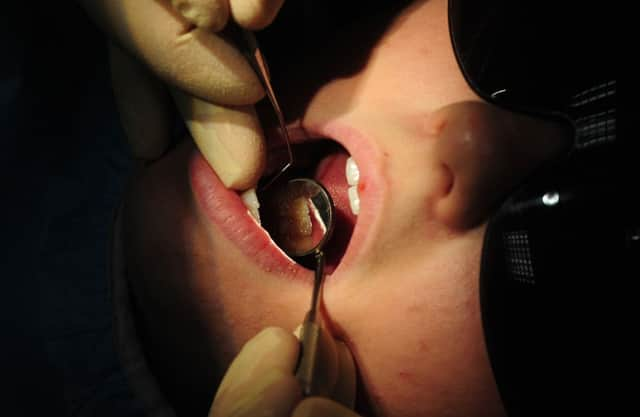Botched treatments at Aberdeen Dental School


One was left with damage to an adjacent tooth after work was carried out, while another suffered tissue damage caused by dental bleach.
Some patients – mainly people booked in for root canal treatment – ended up with perforations, the over-preparation of teeth and the wrong tooth being worked on.
Advertisement
Hide AdAdvertisement
Hide AdInspectors from an industry watchdog raised concerns following a visit to the Aberdeen Dental School in April 2014.
The General Dental Council report comes as Aberdeen University searches for a new director of dentistry following the departure of Professor Helen Craddock, who retired last autumn after just a year in the job.
The report said: “Inspectors were concerned that a number of patients had been harmed and disappointed that the significant threats to the programme were not identified earlier by the school.
“While it was accepted that the graduating cohort’s exposure to the full range of procedures had been negatively impacted by the situation with patient supply, what was seen on occasions were examples of the lowest level of care expected of a safe beginner.”
It emerged from the report that a third of the 22 dental students failed to graduate last year.
Dental school bosses reintroduced a series of clinical tests which were expected to be completed before final exams after an earlier GDC recommendation was misinterpreted.
Senior year students lodged a complaint against this decision.
The supervision increased from one staff member for every six trainee dentists to one staff member for every three following the botched procedures. Inspectors identified shortages of children and adults booked in for crowns or dentures and this had an impact on those graduating from the school, which opened in 2008, last year.
Advertisement
Hide AdAdvertisement
Hide AdAn Aberdeen University spokeswoman said: “All dental schools have rigorous standards of assessment, and as a relatively new dental school we are monitored regularly by the General Dental Council.
“We welcome these inspections as an opportunity for benchmarking our performance, and providing areas for learning, so that we continually improve in training student dentists for clinical practice. Feedback from postgraduate trainers details the very positive contribution and safe practice of previous Aberdeen graduates as they begin their careers as practicing dentists.”
The university stated that students had been working on patients under the supervision of an experienced senior dental clinician when the “adverse events” had happened.
The spokeswoman added: “The patients involved were made immediately aware of any concern with their treatment and the problems were promptly addressed.
“There were no complaints from the patients, and all processes within the school were reviewed and further improved.
“As required of all healthcare institutions, the Dental School will be open with patients if things go wrong, and thoroughly investigate issues, so that we continually learn and improve the systems and processes to improve safety.”
The school had reported two “significant” issues to the General Dental Council in the weeks leading up to the inspection.
In March, it was noted that there was a general shortage of both adult and child patients booking in for appointments for crowns and dentures. An advertising campaign was launched to target unregistered patients in the Grampian region.
Advertisement
Hide AdAdvertisement
Hide AdThe school then contacted the GDC at the beginning of April to report nine problems which had occurred between January and March 2014. A further three incidents involving senior students were reported in May.
Inspectors noted that there were “inadequate precautions” taken to mitigate the risk to patients and prevent the incidents and assessments weighed more heavily on knowledge rather than technical skill.
The report said: “It was the inspectors’ collective view that the lack of refreshment of skills may have been a significant contributing factor to the final year’s difficulties in safely completing more advanced clinical procedures.
“They felt that senior tutors were not suitably mindful of the periods of time between a student learning skills in a pre-clinical environment, and the first opportunity for them to practise the procedure on a patient in clinic.
“It appeared that this could span over a year of the course. They were also of the view that students were not suitably mindful of the need to make patient safety their first priority in their eagerness to secure the necessary experiences.”
There was also a lack of clear incident reporting communication at the school, with some of the 12 incidents only coming to light later through informal conversations between staff.